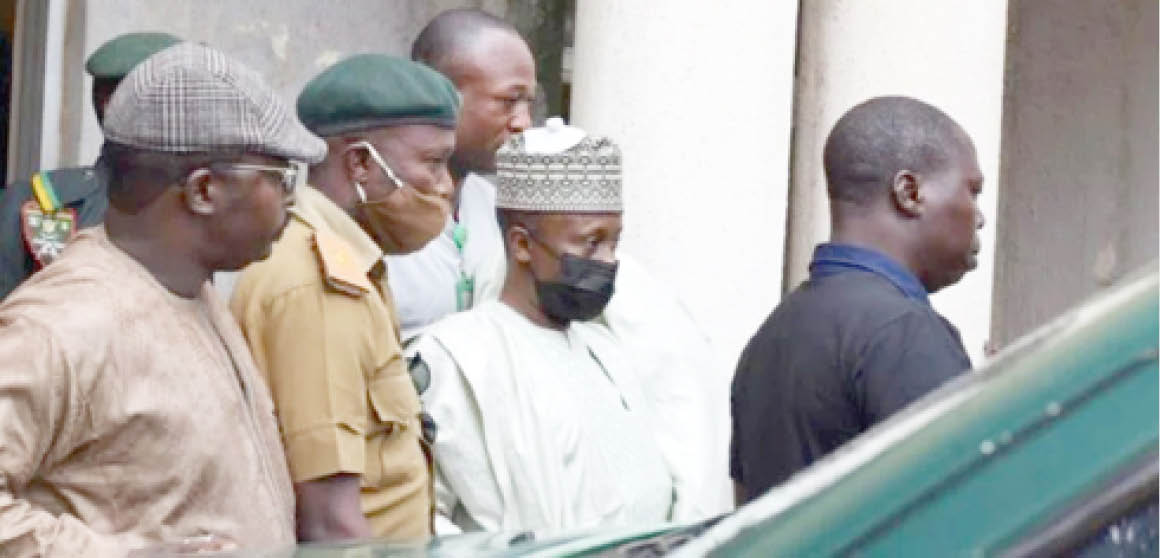Nine years after the scandal that rocked the House of Representatives investigation into fuel subsidy fraud, the chairman of the then ad-hoc investigating committee, Farouk Lawan, has been sentenced to seven years imprisonment for receiving bribe from billionaire oil magnate, Femi Otedola, the owner of one of the firms that were being investigated.
An FCT High Court sitting in Apo presided over on Tuesday by Justice Angela Otaluka found Lawan guilty of all the three counts that bordered around bribery in the case which had travelled to and from the Supreme Court since it began in 2012.
- Senate moves to probe Buhari’s economic recovery plan
- Buhari seeks Senate approval for N895bn supplementary budget
Credible sources said the former legislator has been moved to Kuje Prisons in the outskirt of Abuja.
A source at the prison who does not want to be named confirmed that Lawan was taken there shortly after he was convicted by the court.
“Yes, he was brought here (Kuje correctional facility) straight from the courtroom. From today, he has started serving his jail term and will continue until he finishes his sentence unless he appeals his case and wins the appeal at any point before he will be released,” he said.
While Lawan was convicted for his role in the bribery scandal, charges were however not filed against the giver of the alleged bribe, Otedola, a situation explained by lawyers as justified by law.
Otedola had himself said during the trial that the bribe money he gave to Lawan was given to him by the Department of State Services (DSS) as part of a sting operation.
The former lawmaker was prosecuted on charges of receiving a bribe of $500,000 from Otedola.
The money was part of the $3milllion Lawan requested to have the businessman’s firms removed from the list of companies indicted for fuel subsidy fraud.
While delivering judgment yesterday, the judge held that Lawan’s conduct had elements of corruption.
She held that from the pool of evidence before the court, the prosecuting lawyer, Adegboyega Awomolo (SAN), had established a case of corrupt practices against the defendant in count one of the charge that borders on corruptly requesting a bribe of $3million.
“It is the duty of the defendant to produce materials upon which he places his defence,” she said.
She also said Lawan failed to call one Honourable Ribadu or any member of the house committee to buttress his claim of collecting the money to implicate Otedola, insisting that they were “vital witness” needed to prove his case.
“Count one of the charges is not based on suspicion but on credible evidence. The defendant (Lawan) corruptly asked for $3million and received a $500,000 bribe in two tranches from Femi Otedola,” the judge said.
The judge also dismissed Lawan’s claim that he received the $500,000 to obtain proof of moves by Otedola to induce him and members of his committee.
The judge thereafter sentenced the four-term former federal lawmaker from Kano State to seven years for counts one and two while he was sentenced to five years for count three. The sentences are to run concurrently.
Lawan was also asked to return the $500,000 collected from Otedola to the federal government.
Daily Trust reports that Justice Otaluka was the third judge that heard the case since Lawan’s first arraignment.
Two judges who earlier handled the matter could not conclude it as the first one was elevated to the Court of Appeal bench and the second withdrew after Lawan accused her of bias, the same allegation he earlier levelled against Justice Otaluka.
While Lawan was immediately taken into custody by officials of Nigerian Correctional Services believed to be from the Kuje centre and driven out of the court after the judgment, lawyers said he has a right to appeal the judgment of the court up to the Supreme Court and can also apply for post-conviction bail.
Efforts to know the next line of action from his lawyer, Mike Ozekhome (SAN), were not successful as of the time of filing this report.
The Executive Director, Resource Centre for Human Rights and Civic Education (CHRICED), Dr Ibrahim M. Zikirullahi, said that although it took a long time for Lawan to be convicted, it is a positive development that justice has been delivered at last.
“Farouk Lawan’s corrupt act was a betrayal of public trust reposed in him. His fall from his heights and his journey to prison should send a clear message to all that there are consequences for bad behaviour. CHRICED hopes that the Nigerian system will evolve to a point where more lawbreakers like Lawan would be made to account for their actions,” Zikirullahi said.
Mixed reactions in Kano
Several individuals spoken to in Lawan’s home state of Kano expressed mixed reactions to the judgment.
While some believed justice was served, others believed the 58-year-old academician-turned-politician was a victim of circumstance and power play due to his outspokenness during his time at the green chamber representing Bagwai/Shanono federal constituency.
“The video of that incidence had more or less convicted him since 2012 if we are being sincere and you know it has more or less destroyed his political career,” one of them, who asked not to be named, said.
Why bribe giver cannot be charged — Lawyer
A professor of law, Yemi Akinseye-George (SAN), told Daily Trust that it was impossible for the federal government to charge Otedola for bribery as the giver because he (Otedola) does not have a “guilty intent”.
According to him, “The giver does not have what in law we call ‘guilty intent’.
“He knew he was not supposed to give a bribe and then informed the law enforcement agency to make them part of the process; so, he doesn’t have the guilty intent and without this intent, the law does not punish,” he said.
He explained that for an offence of bribery to be committed, there must be two elements which are the mental and physical elements.
“The mental element of the offence is the state of the mind of the giver at the time he gave. In this case, you don’t have the corrupt mental element.
“All you have is the physical element, which was with the knowledge of law enforcement agents.
“That is why in this case, you cannot talk about punishing the giver because the state of mind of the giver was not to corrupt but to expose corruption,” he added.
Akinseye-George, who was one of the drafters and promoters of the Administration of the Criminal Justice Act (ACJA), further explained that while Lawan can apply for post-conviction bail, granting it is at the discretion of the court after the convict must have met some exceptional circumstances, among which ill-health is top.
Otedola’s evidence against Lawan
Daily Trust recalls as Chairman/Chief Executive Officer (CEO) of Zenon Oil and Gas Limited, Otedola had in his testimony before the court in June 2019 said the money he handed over to Lawan was given to him by the DSS.
He added that the alleged bribe money was given to Lawan in a sting operation.
He said that the DSS, however, did not catch Lawan red-handed at the time of collecting the money from him (Otedola), as shown in a video played in the open court.
He also told the court that he did not have any documentary evidence to the fact that the money was given to him by the DSS, saying that the money was given to him in bits.
He further stated that he did not take down the serial numbers of the money given to him by the DSS, adding that he did not sign any document when collecting the money in bits.
Asked if the content of the envelope exchanging hands in the video could have been a letter or an invitation card, Otedola, who testified as the fifth prosecution witness, said, “Possibly, the content could have been a letter or an invitation card.”
The witness further told the court that going by the video shown in the court, Lawan did not remove his cap and stuff it with dollars.
The video clip played in court
While the video of Lawan receiving the bribe money from Otedola had been trending on the Internet since 2012 when the scandal came to limelight, the federal government tendered and played it in the open court as part of its evidence on May 9, 2017.
The about two-minutes long video CD was tendered and played by the third prosecution witness, David Ojatah who is an operative of the DSS.
Ojatah said he was directed by the Director-General of DSS to mount a camera in Otedola’s house after the DSS received a petition from Otedola alleging that Lawan was demanding the sum of $3 million as a bribe to remove Otedola’s companies from the list of indicted companies in the oil subsidy fraud.
He said immediately Lawan collected the parcels, he (Lawan) put one in his pocket and left with the other one in his hands as seen in the video.
This was even as another prosecution witness, David Igbodo, the then Commissioner of Police in charge of Police Legal Services, told the court that Lawan refused to refund the money despite entering into an undertaking with the Police on 16/06/2012 to refund the $500,000 he collected from Otedola and another $100,000 received from Otedola through one Emenalo Boniface.
Speaking on the development in a telephone interview with one of our correspondents, a former Assistant Director at DSS, Dennis Amachree, said there was nothing special about what the secret police did at that time.
He said, “It was a sting operation and they carried out the operation and you know during the process, somebody fell into the trap. So, there was nothing special about that, it is a normal everyday thing.”
When contacted last night for official reaction, the spokesman of the DSS, Peter Afunanya said, “The DSS is law-abiding and professional.”
From Clement A. Oloyede (Kano), Ismail Mudashir, Abbas Jimoh, Hamisu Kabir Matazu & Idowu Isamotu (Abuja)

 Join Daily Trust WhatsApp Community For Quick Access To News and Happenings Around You.
Join Daily Trust WhatsApp Community For Quick Access To News and Happenings Around You.


